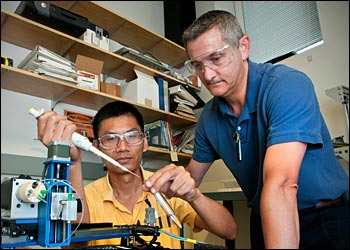By Kalwinder KaurAug 10 2012
The U.S. Department of Energy’s (DOE) Brookhaven National Laboratory has received a $1M grant from the National Institutes of Health (NIH) for procuring new precision detector technology.
 NIH Grants $1 Million Dollars for New Detectors at NSLS
NIH Grants $1 Million Dollars for New Detectors at NSLS
NIH scientists carrying out biomedical research received the award from Office of Research Infrastructure Programs High-End Instrumentation’s Division of Program Coordination, Planning, and Strategic Initiatives. The grant will also support the procurement of new photon-counting detectors for beamline X9 at DOE-funded facility, Brookhaven’s National Synchrotron Light Source (NSLS), which is used by about 2,400 researchers on a yearly basis.
Through photon-counting detectors, biologists can efficiently conduct x-ray scattering on proteins within solution. Using this technique, proteins that interact with other molecules can be clearly captured. Data on protein function can enable researchers to formulate new medicines and drugs.
NSLS generates bright, intense beams of x-rays and various other forms of light, through which researchers can effectively probe atomic-level structures, followed by investigating properties of several materials such as biological molecules, superconductors, and ferromagnets.
Unlike NSLS detectors that carry out data recording process that begins by conversion of incoming x-ray into visible light, followed by measuring the converted visible light’s intensity, the new photon-counting detectors can directly capture each individual x-ray photon, allowing the detection of even weaker signals.
Brookhaven envisions integration of new detectors within NSLS by 2013. These detectors will then be transferred to NSLS-II, where they will be installed at a new beamline LIX. NSLS-II, which is under construction, is expected to generate 10,000x brighter x-rays than NSLS.
Disclaimer: The views expressed here are those of the author expressed in their private capacity and do not necessarily represent the views of AZoM.com Limited T/A AZoNetwork the owner and operator of this website. This disclaimer forms part of the Terms and conditions of use of this website.